R.C. Sproul's Blog, page 588
May 6, 2011
Doctrine of Lord's Supper: Recommended Reading

The Lord’s Supper, the meal that unites, has ironically been the source of much division and controversy throughout church history. It was, in fact, the primary source of division among the sixteenth-century Reformers. Numerous books have been written on the doctrine and practice of the Lord’s Supper. The following are some that I have found to be particularly helpful.
General Works
 Robert Letham. The Lord’s Supper. Letham’s book is a brief introduction to the Reformed doctrine of the Lord’s Supper. It is a good place to start for those wanting to get a basic grasp of the issues.
Robert Letham. The Lord’s Supper. Letham’s book is a brief introduction to the Reformed doctrine of the Lord’s Supper. It is a good place to start for those wanting to get a basic grasp of the issues.
John Calvin’s Doctrine
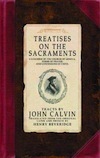 John Calvin. Treatises on the Sacraments. This volume is a reprint of volume 2 in Calvin’s Tracts and Treatises. It contains a number of Calvin’s writings on the Lord’s Supper, although it does not include all of them by any means. It serves as a helpful supplement to his work on the subject in his Institutes and commentaries.
John Calvin. Treatises on the Sacraments. This volume is a reprint of volume 2 in Calvin’s Tracts and Treatises. It contains a number of Calvin’s writings on the Lord’s Supper, although it does not include all of them by any means. It serves as a helpful supplement to his work on the subject in his Institutes and commentaries.
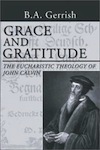 B. A. Gerrish. Grace and Gratitude: The Eucharistic Theology of John Calvin. B.A. Gerrish is one of the world’s foremost Calvin scholars, and this book on Calvin’s doctrine of the Lord’s Supper is a standard. It offers many extremely useful insights on this doctrine.
B. A. Gerrish. Grace and Gratitude: The Eucharistic Theology of John Calvin. B.A. Gerrish is one of the world’s foremost Calvin scholars, and this book on Calvin’s doctrine of the Lord’s Supper is a standard. It offers many extremely useful insights on this doctrine.
 Ronald S. Wallace. Calvin’s Doctrine of the Word and Sacrament. This book is the only book of which I am aware that deals with Calvin’s doctrine of the sacraments in connection with his doctrine of the word of God. It suffers from Wallace’s neo-orthodox tendencies, and from the fact that at times it is little more than a list of Calvin quotes, but is still a helpful book.
Ronald S. Wallace. Calvin’s Doctrine of the Word and Sacrament. This book is the only book of which I am aware that deals with Calvin’s doctrine of the sacraments in connection with his doctrine of the word of God. It suffers from Wallace’s neo-orthodox tendencies, and from the fact that at times it is little more than a list of Calvin quotes, but is still a helpful book.
 Thomas J. Davis. The Clearest Promises of God: The Development of Calvin’s Eucharistic Theology. Davis argues that there is evidence of substantial “change and development” in Calvin’s doctrine of the Lord’s Supper between the first edition of his Institutes in 1536 and the time of his death in 1564. I believe the evidence indicates that by 1541, at the very latest, Calvin’s doctrine of the sacraments was basically settled. What we find from 1541 forward is simply further explanation and clarification, not substantive change. Davis’ book is a fascinating look at Calvin’s doctrine and well worth reading.
Thomas J. Davis. The Clearest Promises of God: The Development of Calvin’s Eucharistic Theology. Davis argues that there is evidence of substantial “change and development” in Calvin’s doctrine of the Lord’s Supper between the first edition of his Institutes in 1536 and the time of his death in 1564. I believe the evidence indicates that by 1541, at the very latest, Calvin’s doctrine of the sacraments was basically settled. What we find from 1541 forward is simply further explanation and clarification, not substantive change. Davis’ book is a fascinating look at Calvin’s doctrine and well worth reading.
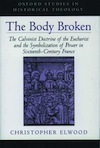 Christopher Elwood. The Body Broken: The Calvinist Doctrine of the Eucharist and the Symbolization of Power in Sixteenth-Century France. Elwood’s scholarly study is not light reading and is not for everybody, but for those with an interest in the subject, he does a good job placing the discussions of the Lord’s Supper within the political context of the sixteenth century.
Christopher Elwood. The Body Broken: The Calvinist Doctrine of the Eucharist and the Symbolization of Power in Sixteenth-Century France. Elwood’s scholarly study is not light reading and is not for everybody, but for those with an interest in the subject, he does a good job placing the discussions of the Lord’s Supper within the political context of the sixteenth century.
 Keith Mathison. Given For You: Reclaiming Calvin’s Doctrine of the Lord’s Supper. This book contains my thoughts on several matters related to Calvin’s doctrine. I have followed this up with a chapter on Calvin’s doctrine of the sacraments in a forthcoming book from Crossway, edited by Derek Thomas and John Tweeddale.
Keith Mathison. Given For You: Reclaiming Calvin’s Doctrine of the Lord’s Supper. This book contains my thoughts on several matters related to Calvin’s doctrine. I have followed this up with a chapter on Calvin’s doctrine of the sacraments in a forthcoming book from Crossway, edited by Derek Thomas and John Tweeddale.
Other Resources
 Robert Bruce. The Mystery of the Lord’s Supper. Robert Bruce (1551-1631) is not a household name, even among knowledgeable Reformed Christians. He was at one time, however, one of the most important leaders in the Church of Scotland. He was the successor of John Knox and James Lawson and preached at the Great Kirk of St. Giles in Edinburgh. The Mystery of the Lord’s Supper (Christian Heritage) contains five sermons preached by Bruce at St. Giles in February and March of the year 1589. See my review here.
Robert Bruce. The Mystery of the Lord’s Supper. Robert Bruce (1551-1631) is not a household name, even among knowledgeable Reformed Christians. He was at one time, however, one of the most important leaders in the Church of Scotland. He was the successor of John Knox and James Lawson and preached at the Great Kirk of St. Giles in Edinburgh. The Mystery of the Lord’s Supper (Christian Heritage) contains five sermons preached by Bruce at St. Giles in February and March of the year 1589. See my review here.
 Jon D. Payne. John Owen on the Lord’s Supper. Owen was one of the greatest Puritan theologians. Payne’s work is a good introduction to his thought on this sacrament.
Jon D. Payne. John Owen on the Lord’s Supper. Owen was one of the greatest Puritan theologians. Payne’s work is a good introduction to his thought on this sacrament.
 John Williamson Nevin. The Mystical Presence: A Vindication of the Reformed or Calvinistic Doctrine of the Holy Eucharist. Nevin was a nineteenth-century American theologian, a contemporary of Charles Hodge, and one of the founders (with Philip Schaff) of the Mercersburg Theology. His extensive written debate with Hodge over the Lord’s Supper is one of the most fascinating episodes in nineteenth-century theology. The Mystical Presence is the book that started the firestorm.
John Williamson Nevin. The Mystical Presence: A Vindication of the Reformed or Calvinistic Doctrine of the Holy Eucharist. Nevin was a nineteenth-century American theologian, a contemporary of Charles Hodge, and one of the founders (with Philip Schaff) of the Mercersburg Theology. His extensive written debate with Hodge over the Lord’s Supper is one of the most fascinating episodes in nineteenth-century theology. The Mystical Presence is the book that started the firestorm.
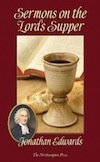 Jonathan Edwards. Sermons on the Lord’s Supper. Jonathan Edwards was easily the most significant theologian America produced in her first centuries of existence. His thoughts on any subject are always worth considering. This is certainly true when it comes to the Lord's Supper.
Jonathan Edwards. Sermons on the Lord’s Supper. Jonathan Edwards was easily the most significant theologian America produced in her first centuries of existence. His thoughts on any subject are always worth considering. This is certainly true when it comes to the Lord's Supper.
 E. Brooks Holifield. The Covenant Sealed: The Development of Puritan Sacramental Theology in Old and New England, 1570–1720. Holifield is one of the most respected church historians alive today. This work is a helpful survey of sacramental theology in the writings of the Puritans. Well worth reading.
E. Brooks Holifield. The Covenant Sealed: The Development of Puritan Sacramental Theology in Old and New England, 1570–1720. Holifield is one of the most respected church historians alive today. This work is a helpful survey of sacramental theology in the writings of the Puritans. Well worth reading.

Resources on Faith for $5 Today
It's $5 Friday time! Find a variety of teaching series covering various aspects of faith. Resources are mostly downloadable this week due to Ligonier Ministries' move this weekend. Sale starts Friday at 8 a.m. and ends Saturday at 8 a.m. EST.

May 5, 2011
Anselm
"Anselm held the position of archbishop of Canterbury from 1093 to 1109. A Benedictine monk, philosopher, and theologian, he stands as one of the most significant thinkers in the history of the Western church." While Anselm's name is widely known, his impact is not. In his article in the current edition of Tabletalk magazine, R.C. Sproul looks at this man's life and influence.
"His influence is not due to the sheer volume of his writings but to his ability to expound profound subjects biblically and thoughtfully in just a few words. In general, the assumption exists that to make a significant contribution to the body of literature that shapes scholarly thought requires the production of massive tomes. Anselm’s impact completely overthrows this notion."
You would do yourself a favor to read this article titled simply "Anselm."

May 4, 2011
VIDEO: CrossReference: Winning Through Weakness
This week we bring you the sixth episode from CrossReference: Discovering Christ in the Old Testament, a new series from David Murray and HeadHeartHand. This series of short teaching films was conceived to help Christians discover and enjoy Christ in the Old Testament.
You can watch the first two episodes here, and the remaining four videos will be available for temporary viewing each week for the next four weeks at the Ligonier blog, Challies, and HeadHeartHand.
The DVD and study guide are now available for purchase. Or you can download the films in HD. Preview the study guide here.
Episode 6: Winning Through Weakness

We're Moving!

After being in our current office building for nearly two decades, Ligonier Ministries is moving. We have been planning for this day for the last seven years and are excited to see how God has graciously worked to bring it all together in His perfect timing.
Our new address is 421 Ligonier Court, Sanford, Florida 32771 and we encourage you to stop by and visit the next time you are in Orlando.
We wish to express our thanks to all who have graciously donated and continue to give to our first-ever Capital Campaign. This ongoing campaign is designed to provide for the future growth and expansion of our outreach, especially through Reformation Bible College at Ligonier Academy.
We ask that you pray for us during this transition—that movers and staff would be safe and that we would adjust quickly to our new location while being faithful in our ministry work.
This week we are focusing our efforts on making this transition go as smoothly as possible. While we do not expect any major disruptions, we wanted to make you aware in case there are any brief delays on our website or regular service. Our resource consultants will still be available at 800-435-4343. Also, please note that there will be a 24-48 hour processing delay for orders placed after noon on Wednesday, May 4, 2011, as we transfer some of our systems. We expect to be operating as usual beginning Monday, May 9.
See some pictures of the new campus here.

Goodness Gracious

Common grace is more potent than we normally think. Special grace, on the other hand, is likely more nuanced than we tend to think. As these United States celebrate the just end to the life of Osama bin Laden, I’m afraid we are in danger of missing both of these truths. First, common grace is keeping the world from being populated with nothing but Osama bin Ladens. The difference between bin Laden and Gandhi isn’t that bin Laden was evil enough to embrace an evil, violent religion while Gandhi was good enough to at least choose and teach a more gentle, false religion. The difference is the amount of common grace given by the living God, the Father of our Lord Jesus. Both men were sinners. Neither gave any sign of having turned to the cross and clinging to the finished work of Christ. And so both men find themselves well beyond the reach of any grace, in eternal torment. Both are receiving what they so richly deserve.
The state itself is a manifestation of common grace. We would be wise to remember that God killed bin Laden, not the United States government. God ordained the state to bear the sword, to punish evildoers. And so in this case they have done so. They have rightly served as His ministers of justice. We should give thanks, to the God who gave us government. That said, what does it say about us that we are dancing in the streets today, while we Christians were so silent and ashamed when notorious abortionist George Tiller was killed? Please don’t misunderstand. I do not believe that private citizens should take the law into their own hands to kill abortionists. But the same state that has spent millions of dollars and nearly ten years to hunt down one killer in bin Laden, in those same years has spent millions of dollars to protect men like George Tiller whose grisly work has resulted in many times over the number of deaths bin Laden gave us. God bless the USA?
Which brings us to the subtlety of special grace. Today even those who have been born again, who are indwelt by the Holy Spirit, who are daily being remade into the image of Christ, find themselves caught up in the twisted and distorted perspective of the world. We are singing “Ding Dong the witch is dead” while hundreds of bin Ladens are murdering more babies than there were adults killed on 9/11. We, who are called to take every thought captive, fail to think deliberately. We are not sober-minded. We have horrible, evil, murderous men in our own neighborhoods, but we are either caught up in celebratory jingo-ism or fevered conspiracy theories.
The truth is that God is in control. He does cause the rain to fall on the just and the unjust. Thus the beleaguered president gets a bump in the polls. Thus a wicked nation celebrates the death of one man that attacked it. On the other hand, our Christian heritage did not protect us on 9/11. Our Christian heritage does not protect our unborn children. Our Christian heritage does not make sure we think cogently, biblically about the day’s events.
For those of us who have been reborn, may I suggest a few steps towards sound thinking? First, Osama is an example of what we would all be with less grace in our lives. By all means give thanks for God’s just judgment. Then be sure to give thanks for His grace in your own life. Second, evil isn’t what you see on television, or what they talk about on talk radio. Evil is what is advertised in the yellow pages. Evil is what is in your state’s budget, as well as the federal budget. Evil is what we call a political issue that we must nuance. Evil is what is happening in that rundown office on the poor side of town. Evil is killing babies. Third, evil is what is in our own hearts because we know what happens in our neighborhoods, and yet think today a good day because one evil man died on the other side of the globe. Fourth, stop waving the flag. But also stop chattering about doctored photos, hurried “burials” and May surprises. Fifth, ask God that He would give us more repentance and the wisdom to stop being led around by our noses by main-stream media, talk radio, and bloggers. Today is a dark day. Babies are being murdered.

May 3, 2011
On True Seekers
Jonathan Edwards used to say that the chief business of the Christian was the seeking of the Kingdom of God. And what he meant by that was the chief business of the Christian is seeking after God. We have such a superficial understanding of seeking that we attribute it to non-believers when the non-believer is not seeking God—he's running away from God. He is seeking the benefits that only God can give him, but he wants the benefits of God without God. The seeking after God starts at conversion; it doesn't end there. To get beyond infantile Christianity really involves being on a mission, on a quest to know God. It's got to be a passion. It can't be something we just do in our spare time. And where that desire to know Him takes us every single time is to the Word.
From: Ministry Reflections with John Piper & R.C. Sproul

An 11th Century Reformer
In this month's editorial introduction to the May issue of Tabletalk--an issue that looks to the church of the 11th century--Burk Parsons writes about a little-known Christian monarch. "Queen Margaret of Scotland (c. 1045–1093) is barely mentioned in the annals of church history. Nevertheless, she was used of God mightily in eleventh-century Scotland. While the first crusade raged, while schism rent the church in the East, and while Anselm ministered in her homeland of England, Margaret was on her knees praying earnestly for her husband, the king of Scotland. Legend has it that as a new queen, Margaret would quietly slip out at night to a nearby cavern to pray for her husband’s conversion to Christ."
The Lord saw fit to answer those prayers. "At first, she was suspected of treason in plotting against her husband’s kingdom; however, she was vindicated in time as King Malcolm was converted and transformed, which, in turn, brought about transformation of his royal court and, ultimately, the nation of Scotland."
Read more about this 11th Century Reformer.

May 2, 2011
Free Preview of John from Logos Bible Software
 This week, May 2–7, 2011, Reformation Trust Publishing is partnering with Logos Bible Software to offer a free preview of John, the second title in the St. Andrew’s Expositional Commentary series by Dr. R.C. Sproul.
This week, May 2–7, 2011, Reformation Trust Publishing is partnering with Logos Bible Software to offer a free preview of John, the second title in the St. Andrew’s Expositional Commentary series by Dr. R.C. Sproul.
This introduction to the Gospel of John provides glimpses into the goals that John had in writing his Gospel, the background for Jesus’ time, and the meanings of some of John’s most difficult passages. Dr. Sproul offers insights and exhortations to draw men and women closer to the Savior, and encourage him or her to a greater depth of love and devotion to Him.
John represents the fruits of a lifetime of biblical study as expressed in Dr. Sproul’s pulpit ministry at St. Andrew’s in Sanford, Florida. He has now begun to adapt those sermon series in book form, and the result is the St. Andrew’s Expositional Commentary series.
How to Access the Free Preview
Free book previews are a feature available through Logos Bible Software's free app for the iPhone, iPod Touch and iPad. Simply download the app, create an account (or sign in) and enjoy the free preview.
Other Ligonier titles available through Logos Bible Software:
Reformation Trust Collection (Thirty-five Volumes)
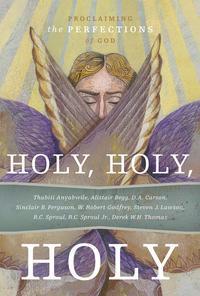 There is still time to get the thirty-five volume Reformation Trust Collection for $269.95 (retail $499). It includes thirty-five books by leading Reformed pastors and scholars, men who are adept at rightly handling the Word of God.
There is still time to get the thirty-five volume Reformation Trust Collection for $269.95 (retail $499). It includes thirty-five books by leading Reformed pastors and scholars, men who are adept at rightly handling the Word of God.
Tabletalk Magazine - 265 issues (February 1989 to January 2011)
Tabletalk magazine was formed in 1977 to provide a substantive study tool for believers. Though its format has changed over the years, 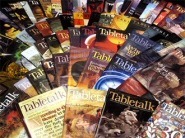 Tabletalk continues to challenge and encourage readers to dig deeper into the Word of God in order that their lives may be transformed through the renewing of their minds (Rom. 12:1–2). Over the years, the magazine has been recognized for its excellence through several awards. Today, people all over the world read Tabletalk on a daily basis. It is regularly found in seminary libraries and churches throughout the country. Logos Bible Software is making 264 issues available now through pre-pub for less than $1.40 an issue.
Tabletalk continues to challenge and encourage readers to dig deeper into the Word of God in order that their lives may be transformed through the renewing of their minds (Rom. 12:1–2). Over the years, the magazine has been recognized for its excellence through several awards. Today, people all over the world read Tabletalk on a daily basis. It is regularly found in seminary libraries and churches throughout the country. Logos Bible Software is making 264 issues available now through pre-pub for less than $1.40 an issue.

Columns from Tabletalk Magazine, May 2011
The May edition of Tabletalk is out. Continuing our ongoing series on the history of the church, this month's issue focuses on the eleventh century looking at the great schism between the churches in the East and West, the investiture controversy, the crusades, and Anselm of Canterbury. Contributors include R.C. Sproul, John Piper, Justin Holcomb, Mark Driscoll, Michael Brown, Keith Mathison, and R.C. Sproul Jr.
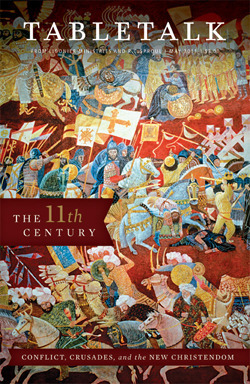 We do not post all of the feature articles or the daily devotionals from the issue, so you'll have to subscribe to get those. But for now, here are links to a few select columns and articles from this month:
We do not post all of the feature articles or the daily devotionals from the issue, so you'll have to subscribe to get those. But for now, here are links to a few select columns and articles from this month:
"An 11th Century Reformer" by Burk Parsons
"Anselm" by R.C. Sproul
"Schism and the Local Church" by Michael G. Brown
"Our Ancient Foe" by Keith Mathison
"Human Trafficking in God's World" by Justin Holcomb
"An Outpost of Jesus' Kingdom: An Interview with Mark Driscoll"
"The Children's Crusade" by R.C. Sproul Jr.
"Christian Exiles" by John Piper
*****
If you have not subscribed yet, you should. It's only $23 for a year, and $20 to renew. You save even more if you get a 2- or 3-year subscription (as little as $1.36 per issue). Special discounts for churches or businesses are available for those who want multiple copies of each issue. Start receiving Tabletalk by calling one of Ligonier Ministries' resource consultants at 800-435-4343 (8am-8pm ET, Mon-Fri) or subscribe online.

R.C. Sproul's Blog
- R.C. Sproul's profile
- 1968 followers




